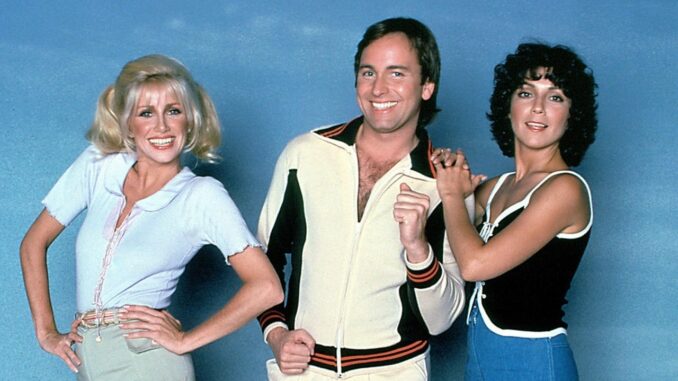
A Fight for Equality in Hollywood
In the glitz and glamour of 1980s Hollywood, one bold demand for fairness changed everything. Suzanne Somers, known for her iconic role as Chrissy Snow on Three’s Company, dared to ask for equal pay at the height of her fame. What followed was a career-altering fallout, sparking debates about gender equality in Hollywood that still resonate today.
But what led to this dramatic moment? Why did asking for fair pay lead to Somers’ dismissal? Let’s dive into this fascinating story of courage, controversy, and change.
The Rise of Suzanne Somers
The Darling of Prime-Time Television
By 1980, Suzanne Somers had become a household name. Her portrayal of the bubbly, lovable Chrissy Snow captured hearts across America. At the height of its popularity, Three’s Company was pulling in millions of viewers weekly, making it one of the most-watched sitcoms of the era.
Unequal Pay in the Spotlight
Despite her significant contribution to the show’s success, Somers was earning far less than her male co-star, John Ritter. Ritter, who played Jack Tripper, reportedly earned $150,000 per episode, while Somers took home a mere $30,000. The disparity was staggering—and reflective of broader systemic issues in Hollywood.
The Equal Pay Showdown
The Catalyst: A Simple Demand
In 1980, armed with confidence and backed by her husband-turned-manager, Alan Hamel, Somers approached the network executives with a bold request: equal pay. She sought parity with John Ritter, arguing that her role was equally vital to the show’s success.
The Network’s Reaction
Rather than engaging in meaningful negotiations, the network dismissed her request outright. Executives labeled her demand as “greedy” and “unreasonable,” ignoring the underlying issues of gender discrimination.
The Fallout: Suzanne Somers Fired
From Star to Outcast
Instead of granting her a raise, the network retaliated. Somers’ screen time was drastically reduced, relegating her character to brief phone calls. By the end of the season, she was unceremoniously fired.
Public Backlash and Media Frenzy
News of Somers’ firing spread like wildfire. While some fans supported her, others viewed her as a diva. The media, known for sensationalism, painted her as a cautionary tale of ambition gone wrong.
The Bigger Picture: Gender Equality in Hollywood
A Reflection of the Times
Somers’ battle for equal pay highlighted the stark gender disparities in Hollywood. During the 1980s, it was common for women in the industry to earn significantly less than their male counterparts, regardless of their contributions or star power.
The Legacy of Her Stand
Though her dismissal was a professional setback, Somers’ fight for equality became a rallying cry. Decades later, her story remains a cornerstone of conversations about pay equity in entertainment and beyond.
Life After ‘Three’s Company’
Rebuilding a Career
After her firing, Somers faced years of professional struggles. Many industry insiders blacklisted her, labeling her “difficult.” However, she refused to fade into obscurity.
A New Chapter: Reinventing Herself
By the late 1980s, Suzanne Somers had reinvented herself as a fitness icon, author, and entrepreneur. From bestselling books to the wildly popular ThighMaster, she proved that resilience and creativity could spark new opportunities.
Why Suzanne Somers’ Story Still Matters
Inspiring Future Generations
Somers’ courage paved the way for actresses and professionals in all industries to demand their worth. Her story resonates with anyone who has faced inequity and dared to challenge the status quo.
Hollywood’s Slow Progress
While some progress has been made, the entertainment industry continues to grapple with pay disparities. Stars like Jennifer Lawrence and Michelle Williams have echoed Somers’ sentiments, reigniting the push for equal pay decades later.
Conclusion: A Risk Worth Taking
Suzanne Somers’ fight for equal pay wasn’t just about a paycheck—it was about principle. Her dismissal from Three’s Company serves as both a cautionary tale and an inspiring example of standing up for what’s right, even when the odds are against you.
Would she do it all again? According to Somers herself, the answer is a resounding yes. Her story is a testament to the power of perseverance, proving that sometimes, losing a battle can mean winning the war.
FAQs
1. Why was Suzanne Somers fired from Three’s Company?
Suzanne Somers was fired after she asked for equal pay with her male co-star, John Ritter. The network deemed her demand unreasonable and subsequently reduced her role before letting her go.
2. How much was Suzanne Somers earning compared to John Ritter?
While John Ritter earned $150,000 per episode, Suzanne Somers earned just $30,000—only a fraction of her co-star’s salary.
3. Did Suzanne Somers regret asking for equal pay?
No, Suzanne Somers has stated that she does not regret taking a stand for pay equality, despite the personal and professional challenges it brought.
4. How did Suzanne Somers rebuild her career after being fired?
Somers reinvented herself as a fitness icon and successful entrepreneur, launching products like the ThighMaster and authoring bestselling books.
5. What is Suzanne Somers’ legacy in Hollywood?
Somers is remembered as a trailblazer who highlighted gender pay disparities in Hollywood, inspiring future generations to fight for equality.
